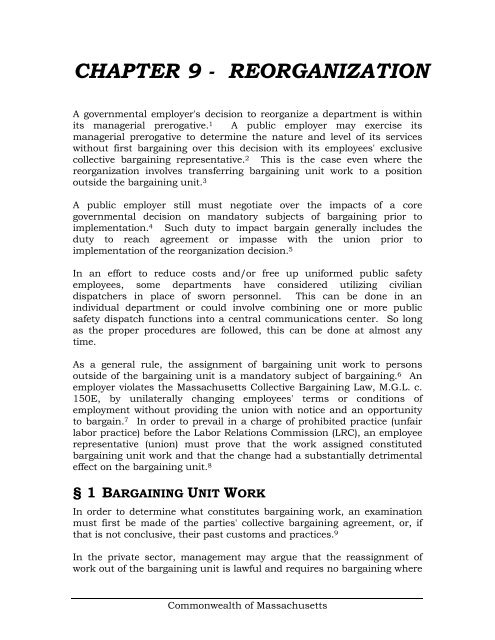Management Rights - AELE's Home Page
Management Rights - AELE's Home Page
Management Rights - AELE's Home Page
You also want an ePaper? Increase the reach of your titles
YUMPU automatically turns print PDFs into web optimized ePapers that Google loves.
CHAPTER 9 - REORGANIZATION<br />
A governmental employer's decision to reorganize a department is within<br />
its managerial prerogative. 1 A public employer may exercise its<br />
managerial prerogative to determine the nature and level of its services<br />
without first bargaining over this decision with its employees' exclusive<br />
collective bargaining representative. 2 This is the case even where the<br />
reorganization involves transferring bargaining unit work to a position<br />
outside the bargaining unit. 3<br />
A public employer still must negotiate over the impacts of a core<br />
governmental decision on mandatory subjects of bargaining prior to<br />
implementation. 4 Such duty to impact bargain generally includes the<br />
duty to reach agreement or impasse with the union prior to<br />
implementation of the reorganization decision. 5<br />
In an effort to reduce costs and/or free up uniformed public safety<br />
employees, some departments have considered utilizing civilian<br />
dispatchers in place of sworn personnel. This can be done in an<br />
individual department or could involve combining one or more public<br />
safety dispatch functions into a central communications center. So long<br />
as the proper procedures are followed, this can be done at almost any<br />
time.<br />
As a general rule, the assignment of bargaining unit work to persons<br />
outside of the bargaining unit is a mandatory subject of bargaining. 6 An<br />
employer violates the Massachusetts Collective Bargaining Law, M.G.L. c.<br />
150E, by unilaterally changing employees' terms or conditions of<br />
employment without providing the union with notice and an opportunity<br />
to bargain. 7 In order to prevail in a charge of prohibited practice (unfair<br />
labor practice) before the Labor Relations Commission (LRC), an employee<br />
representative (union) must prove that the work assigned constituted<br />
bargaining unit work and that the change had a substantially detrimental<br />
effect on the bargaining unit. 8<br />
§ 1 BARGAINING UNIT WORK<br />
In order to determine what constitutes bargaining work, an examination<br />
must first be made of the parties' collective bargaining agreement, or, if<br />
that is not conclusive, their past customs and practices. 9<br />
In the private sector, management may argue that the reassignment of<br />
work out of the bargaining unit is lawful and requires no bargaining where<br />
Commonwealth of Massachusetts
















